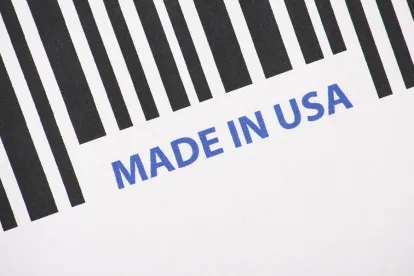Recent modifications to regulations and federal government acquisition policies portend big change for contractors across the US, and their suppliers around the world. Breaking away from traditional political positions, former President Donald Trump and newly-inaugurated President Joe Biden each took steps in January 2021 to revise Buy American Act (BAA) requirements, which could have significant impacts on companies doing business with the US government.
Federal Acquisition Council Issues Final Rule
On January 19, 2021 – the day before inauguration – the Federal Acquisition Regulatory Council (the FAR Council) issued its long-anticipated Final Rule, largely implementing a July 2019 Trump Administration Executive Order seeking to maximize the use of US-made goods. The Final Rule makes three key changes to BAA requirements.
First, it creates a new category of products that are “wholly or predominantly of iron or steel.” These are products where the cost of the iron and steel content exceeds 50% of total component costs. Such products now qualify as “Domestic End Products” only if the cost of foreign iron and steel constitutes less than 5% of total component costs (excluding the value of commercial-off-the-shelf (COTS) fasteners). Moreover, for these purposes, iron and steel is considered “foreign” unless it has been produced in a US mill (i.e., been “melted and poured” in the US).
Second, with the exception of products that are “wholly or predominantly of iron or steel”, it increases the percentage of total component costs that must be attributable to domestic components in order to qualify as a “domestic end product.” Previously, an item qualified as a domestic end product if more than 50% of the cost of components were of US origin. The Final Rule increases this domestic content requirement to 55%.
Third, while still allowing foreign purchases under the BAA, the Final Rule increases the price evaluation preference for suppliers of domestic end products for civilian agency purchases but keeps the US Department of Defense price preference at 50%. Previously, suppliers enjoyed an evaluation preference of 6%, or 12% for small business suppliers. The Final Rule increases this preference from 6% to 20% for large businesses and from 12% to 30% for small businesses.
On January 20, 2021, White House Chief of Staff Ron Klain ordered a freeze on new or pending rules penned by the Trump Administration. Biden officials pulled all regulations submitted to, but not yet published in, the Federal Register; for those rules that had already been published but have not yet entered into effect, officials were urged to consider postponing effective dates for 60 days. The Final Rule became effective January 21, 2021, and applies to solicitations issued on or after February 22, 2021, and resultant contracts. Notwithstanding Klain’s memorandum, the FAR Council has not announced any implementation delay as of this time.
Executive Order On “Ensuring The Future Is Made In All Of America By All Of America’s Workers”
On January 25, 2021, President Biden signed an Executive Order titled “Ensuring the Future Is Made in All of America by All of America’s Workers” (the Executive Order). The Executive Order sets up a new process for review of proposed waivers to “Made in America Laws” and updates domestic preferences to ensure “that when the federal government spends taxpayer dollars, they are spent on American made goods by American workers and with American-made component parts.” The action does not on its own make significant changes to actual legal requirements faced by suppliers, but it does tee up more scrutiny of waivers and the potential for new rulemakings revising requirements further in the near-term.
Applicability
The Executive Order generally covers all “Made in America Laws,” which it defines as including “all statutes, regulations, rules and Executive Orders relating to Federal financial assistance awards of Federal procurement, including those that refer to ‘Buy America’ or ‘Buy American,’ that require, or provide a preference for, the purchase or acquisition of goods, products, or materials produced in the United States, including iron, steel, and manufactured goods offered in the United States.” The Executive Order also cites the Jones Act, which requires all vessels carrying goods between ports in the US be made in, built in, flagged in, and crewed by those from the US.
Review of Proposed Waivers
The Executive Order directs the Director of the Office of Management and Budget (OMB) to create a new Made in America Office, to be led by a Director. The Made in America Director will oversee a more centralized review of waivers to various Made in America Laws across the federal government.
As part of the review process, the federal agencies will be required to provide a detailed description and justification for the proposed waiver. In considering a waiver for “public interest,” the granting agency must also “assess whether a significant portion of the cost advantage of a foreign-sourced product” is from the use of subsidized or dumped imports. This assessment can be done in consultation with the US Department of Commerce’s International Trade Administration.
The Made in America Director (acting on behalf of the OMB Director) will consider whether the proposed waiver is consistent with governing law and administration policy. If the Made in America Director rejects the justifications for the proposed waiver, he or she will provide written notice to the agency head. In the case of such disagreement, the parties will follow the procedure outlined in section 7 of Executive Order 12866 on Regulatory Planning and Review (September 30, 1993), potentially escalating the deliberations to the President and Vice President. Federal agencies may undertake a proposed waiver without OMB review if “a granting agency is obligated by law to act more quickly than the review procedures.”
The Executive Order also creates a public website to provide information on all proposed and granted waivers to the extent permissible under law and as consistent with any “national security and executive branch confidentiality interests.”
Manufacturing Extension Partnership
In an effort to expand the federal contracting opportunities to new domestic partners, the Executive Order instructs federal agencies to use the National Institute of Standards and Technology’s Hollings Manufacturing Extension Partnership (MEP) to conduct “supplier scouting.” This effort, undertaken to the extent appropriate and consistent with relevant law, aims to identify US companies able to meet federal procurement requirements and to expand the community of US companies working with the federal government.
Potential FAR Amendments
The Executive Order requires the FAR Council to consider certain amendments to the FAR by July 25, 2021. These amendments are to address (1) a replacement of the “component test” used to identify domestic end products and construction materials, (2) increase the domestic content requirements for domestic end products and construction materials, and (3) increase the price preference for domestic end products and construction materials. The specific terms of the changes will likely evolve over the next six months, and interested parties will be able to provide comments as part of the rulemaking process.
List of Domestically Nonavailable Articles
The Executive Order requires the FAR Council to consult with the Secretary of Commerce, as well as the director of the Made in America Office, before amending the list of domestically nonavailable articles under FAR 25.104(a). These consultations must include an analysis of relevant markets and market research “to determine whether there is a reasonable basis to conclude that the article, material, or supply is not mined, produced, or manufactured in the US in sufficient and reasonably available commercial quantities and of a satisfactory quality.”
Information Technology That is a Commercial Item
The Executive Order requires the FAR Council to “promptly review existing constraints on” the application of relevant legal regimes to information technology. The Executive Order also requires the development of recommendations for removing such restraints as consistent with applicable law and administration policy.
Under the FAR, information technology is defined as “any equipment, or interconnected system(s) or subsystem(s) of equipment, that is used in the automatic acquisition, storage, analysis, evaluation, manipulation, management, movement, control, display, switching, interchange, transmission, or reception of data or information by” a federal agency.
Reporting Requirement
By July 25, 2021, a number of relevant federal agencies must submit a report to the Made in America Director addressing implementation and compliance with the relevant legal requirements. The report must discuss the agency’s “ongoing use of any longstanding or nationwide waivers.” Following the submission of the first report, the agencies must submit biannual reports on similar topics, including an analysis of spending based on “waivers issued pursuant to the Trade Agreements Act of 1979” and designated by country of origin.
Products Offered on Federal Government Property
The Executive Order requires the General Services Administration to provide recommendations to the Made in America Director by July 25, 2021, on ways to ensure “that products offered to the general public on Federal property are procured in accordance with” administration policy.
Revocation and Supersession of Certain Prior Actions
The Executive Order revokes all or part of three prior executive orders that were issued by President Donald Trump, including: (1) Executive Order 13788 Buy American and Hire American (April 18, 2017); (2) section 5 of Executive Order 13858 Strengthening Buy-American Preferences for Infrastructure Projects (January 31, 2019); and (3) Executive Order 13975 Encouraging Buy American Policies for the United States Postal Service (January 14, 2021).
Additionally, the Executive Order supersedes certain prior executive orders to the extent the prior orders are inconsistent with the Executive Order. These prior orders, which are not otherwise overturned, include: (1) Executive Order 10582 Prescribing Uniform Procedures for Certain Determinations Under the Buy-America Act (December 17, 1954); and (2) Executive Order 13881 Maximizing Use of American-Made Goods, Products, and Materials (July 15, 2019). Notably, Executive Order 13881 – which remains in effect – serves as the basis for the FAR Final Rule discussed above.
Conclusion
Democrats and Republicans are united in their focus on promoting US workers and businesses, particularly as part of efforts to rebuild the US economy after the COVID-19 pandemic. Both the Executive Order and the FAR Final Rule amend previous requirements under the BAA, with potential to impact long-standing supply chains and increase scrutiny of waivers to Made in America laws going forward. Government contractors and suppliers could face a more complex legal landscape as a result.






 />i
/>i

